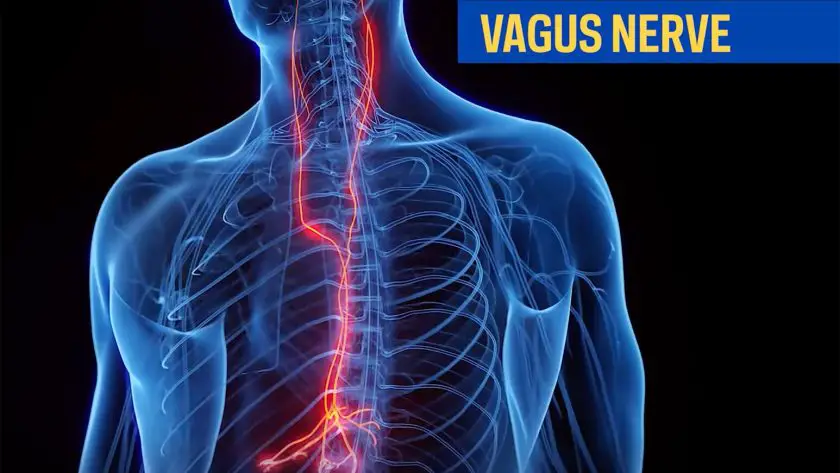The vagus nerve, also known as the tenth cranial nerve (CN X), is part of the parasympathetic nervous system, often called the “rest and digest” system. It’s responsible for calming the body after stress, regulating heartbeat, controlling digestion, and even modulating inflammation.
It’s not just one nerve—it’s more like a bi-directional information highway. Roughly 80% of its fibers send information from your body to your brain, and the other 20% go from your brain to your organs. That means what’s happening in your gut, lungs, or heart is constantly being reported back to your brain—and vice versa.
How the Vagus Nerve Impacts Key Systems
🧠 Brain Health
The vagus nerve directly connects your brain to your organs. It helps regulate mood and emotional stability by influencing neurotransmitters like GABA and serotonin. Low vagal tone (a measure of how well your vagus nerve is functioning) is linked to anxiety, depression, brain fog, and even neurodegenerative diseases like Alzheimer’s.
❤️ Cardiovascular System
The vagus nerve helps slow your heart rate and lower blood pressure. It’s deeply involved in the baroreceptor reflex, which keeps your heart rate balanced in response to changes in blood pressure. People with higher vagal tone tend to have better heart rate variability (HRV), a marker of cardiovascular health and resilience to stress.
🍽️ Digestive Health
This nerve is the main neural highway to your gut. It stimulates digestive enzymes, bile flow, and gut motility (the movement of food through your digestive system). If your vagus nerve isn’t firing properly, you may deal with constipation, bloating, indigestion, or even conditions like IBS or leaky gut.
Signs Your Vagus Nerve May Be Underactive
- Anxiety or panic attacks
- Poor digestion
- Irregular heartbeat
- Low energy and fatigue
- Brain fog or memory issues
- Poor stress tolerance
- Inflammation or autoimmune flares
How to Stimulate the Vagus Nerve Naturally
Improving vagal tone isn’t complicated, but it takes consistency. Here are simple, science-backed ways to stimulate your vagus nerve daily:
🧘 1. Deep, Slow Breathing
Take slow breaths into your belly—4 seconds in, 6 seconds out. Exhaling longer than you inhale activates the parasympathetic system. Do this for 2–5 minutes a few times a day.
❄️ 2. Cold Exposure
Splash cold water on your face or take a cold shower. This triggers the vagus nerve via the diving reflex, helping lower heart rate and promote calm.
🗣️ 3. Humming, Chanting, or Singing
The vagus nerve runs through the vocal cords and throat. Humming, chanting “OM,” or singing vibrates the nerve and boosts its activity. It’s no coincidence monks chant—it literally calms the nervous system.
🧂 4. Gargling
Gargling with water for 30 seconds to 1 minute a day activates the vagus nerve by stimulating the muscles in the back of the throat.
🧘♂️ 5. Meditation and Mindfulness
Practicing mindfulness or meditation shifts your body into parasympathetic mode and enhances vagal tone. Even 10 minutes a day can make a noticeable difference over time.
🐟 6. Omega-3 Fatty Acids
Found in fish oil, flax seeds, and walnuts, omega-3s improve vagal tone and support anti-inflammatory processes governed by the vagus nerve.
🚶♂️ 7. Gentle Movement
Yoga, tai chi, and even walking outdoors can stimulate the vagus nerve while lowering stress hormones like cortisol.
🧍♂️ 8. Posture and Spinal Alignment
Because the vagus nerve runs down the spine, poor posture and tension in the neck or upper back can impact it. Regular stretching and chiropractic adjustments can help.
Why I Love The Apollo Neuro For Nervous System & Vagal Stimulation
The Apollo Neuro is a wearable device designed to help regulate your nervous system by using gentle vibrations to stimulate the vagus nerve and promote a state of calm. Developed by neuroscientists and physicians, Apollo works by delivering silent, low-frequency waves to your body that signal safety to your brain—helping you shift out of “fight or flight” and into “rest and digest.” Clinical studies have shown that Apollo can improve heart rate variability (HRV), sleep quality, focus, and stress resilience. It’s especially beneficial for those dealing with anxiety, PTSD, burnout, or sleep issues, offering a non-invasive way to support the autonomic nervous system.
Apollo comes with a sleek app that allows you to choose from different modes like “Energy and Wake Up,” “Clear and Focused,” “Social and Open,” “Rebuild and Recover,” and “Sleep and Renew.” Each setting delivers a distinct vibration pattern scientifically tuned to shift your state of being—whether you need to relax before bed, focus during work, or recover after a workout. The device can be worn on your wrist, ankle, or clipped to clothing, and it’s fully customizable based on your daily schedule. With its personalized approach and science-backed foundation, Apollo Neuro is like having a nervous system coach in your pocket.
Click Here To Visit Apollo Neuro’s Website Today!
Bottom Line: The Body’s Built-In Reset Button
The vagus nerve is your biological brake pedal—it slows you down, cools your stress, and brings your systems into balance. If you’re dealing with stress, sluggish digestion, low energy, or poor mood, improving your vagal tone could be the missing link.
And the best part? You don’t need meds, tech, or special equipment.
Just a few minutes of breathing, humming, or cold exposure can start rewiring your nervous system for the better.
Your body is listening to your brain—and your brain is listening to your body. Stimulate the vagus nerve in this easy way, and take back control of your health.




